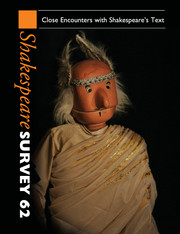Book contents
- Frontmatter
- Shakespeare, text and paratext
- The popularity of Shakespeare in print
- The continuing importance of new Bibliographical method
- ‘Honour the real thing’: Shakespeare, Trauma and Titus Andronicus in South Africa
- ‘O, these encounterers’: on Shakespeare’s meetings and partings
- A play of modals: Grammar and potential action in early Shakespeare
- Merry, marry, Mary: Shakespearian wordplay and Twelfth Night
- A subtle point: Sleeves, tents and ‘Ariachne’s broken woof’ (again)
- The look of Othello
- Red button Shakespeare
- ‘Mark you / his absolute shall?’: Multitudinous tongues and contested words in Coriolanus
- Chagall’s Tempest: An autobiographical reading
- Reading illustrated editions: Methodology and the limits of interpretation
- Close encounters with Anne Brontë's Shakespeare
- Shakespeare and the magic lantern
- Shakespeare and the coconuts: close encounters in post-apartheid South Africa
- The Schrödinger effect: Reading and misreading performance
- Behind the scenes
- Inner monologues: Realist acting and/as Shakespearian performance text
- More japanized, casual and transgender shakespeares
- Translation futures: Shakespearians and the foreign text
- After translation
- ‘The single and peculiar life’: Hamlet’s heart and the early modern subject
- Mapping King Lear
- ‘Last on the stage’: The place of Shakespeare in Charles Darwin’s ethology
- Sense/memory/sense-memory: Reading narratives of Shakespearian rehearsals
- Shakespeare performances in England (and Wales), 2008
- Professional Shakespeare productions in the British Isles, January–December 2007
- The Year's Contributions to Shakespearian Study 1 Critical Studies
- 2 Shakespeare in performance
- 3a Editions and textual studies
- 3b Editions and textual studies
- Index to Volume 62
‘Honour the real thing’: Shakespeare, Trauma and Titus Andronicus in South Africa
Published online by Cambridge University Press: 28 November 2009
- Frontmatter
- Shakespeare, text and paratext
- The popularity of Shakespeare in print
- The continuing importance of new Bibliographical method
- ‘Honour the real thing’: Shakespeare, Trauma and Titus Andronicus in South Africa
- ‘O, these encounterers’: on Shakespeare’s meetings and partings
- A play of modals: Grammar and potential action in early Shakespeare
- Merry, marry, Mary: Shakespearian wordplay and Twelfth Night
- A subtle point: Sleeves, tents and ‘Ariachne’s broken woof’ (again)
- The look of Othello
- Red button Shakespeare
- ‘Mark you / his absolute shall?’: Multitudinous tongues and contested words in Coriolanus
- Chagall’s Tempest: An autobiographical reading
- Reading illustrated editions: Methodology and the limits of interpretation
- Close encounters with Anne Brontë's Shakespeare
- Shakespeare and the magic lantern
- Shakespeare and the coconuts: close encounters in post-apartheid South Africa
- The Schrödinger effect: Reading and misreading performance
- Behind the scenes
- Inner monologues: Realist acting and/as Shakespearian performance text
- More japanized, casual and transgender shakespeares
- Translation futures: Shakespearians and the foreign text
- After translation
- ‘The single and peculiar life’: Hamlet’s heart and the early modern subject
- Mapping King Lear
- ‘Last on the stage’: The place of Shakespeare in Charles Darwin’s ethology
- Sense/memory/sense-memory: Reading narratives of Shakespearian rehearsals
- Shakespeare performances in England (and Wales), 2008
- Professional Shakespeare productions in the British Isles, January–December 2007
- The Year's Contributions to Shakespearian Study 1 Critical Studies
- 2 Shakespeare in performance
- 3a Editions and textual studies
- 3b Editions and textual studies
- Index to Volume 62
Summary
The turn to the traumatic has gained considerable currency in a range of humanities’ disciplines over the last fifteen years, alongside an increased popular usage of the term following the inclusion of Post-traumatic Stress Disorder (PTSD) in the Diagnostic and Statistical Manual of Mental Disorders of the American Psychiatric Association in 1980. Trauma, which derives from the Greek τραύμα, literally meaning ‘wound’, denotes both a ‘wound, or external bodily injury in general’ (OED 1), and, in the context of developments in psychoanalysis and psychiatry, it emerges in the late nineteenth century as a ‘psychic injury, esp. one caused by emotional shock the memory of which is repressed and remains unhealed; an internal injury, esp. to the brain, which may result in a behavioural disorder of organic origin’ (OED 2a). The shift to the realm of the psychic, which can be traced through the work of John Erichsen, Jean-Martin Charcot, Sigmund Freud, Josef Breuer and, more recently, Dominick LaCapra, Cathy Caruth, Kirby Farrell, Ruth Leys and Ann Cvetkovich, among others, retains the language of the wound and injury but variously associates it with both behavioural responses to physical injury and, crucially for this article and work in the humanities, to ‘emotional shock’, the effects of which are still being felt. As Caruth summarizes, ‘trauma is described as the response to an unexpected or overwhelming violent event or events that are not fully grasped as they occur, but return later in repeated flashbacks, nightmares, and other repetitive phenomena’. She goes on to argue that this opens a paradox in the traumatic experience: ‘that the most direct seeing of a violent event may occur as an absolute inability to know it; that immediacy, paradoxically, may take the form of belatedness’.
- Type
- Chapter
- Information
- Shakespeare Survey , pp. 46 - 57Publisher: Cambridge University PressPrint publication year: 2009



